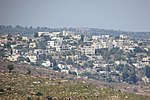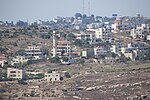'Atara
Municipalities of the State of PalestineRamallah and al-Bireh GovernorateVillages in the West Bank

'Atara (Arabic: عطارة 'Atâra) is a Palestinian village in the Ramallah and al-Bireh Governorate, located 15 kilometers north of Ramallah in the central West Bank. It is situated along a mountain ridge line with four peaks and is built upon the second highest point in the West Bank at 810 meters above sea level. 'Atara's total land area consists of 9,545 dunams, most of which is cultivable.
Excerpt from the Wikipedia article 'Atara (License: CC BY-SA 3.0, Authors, Images).'Atara
Atara,
Geographical coordinates (GPS) Address Nearby Places Show on map
Geographical coordinates (GPS)
| Latitude | Longitude |
|---|---|
| N 32.0025 ° | E 35.206388888889 ° |
Address
Atara
Atara
Palestinian Territories
Open on Google Maps






